5 Signs You May Need an Assistive Mobility Device

Your retirement years should be filled with activities you find meaningful – spending time with family and friends, learning new hobbies or just spending time outdoors enjoying God’s creation. Thanks to assistive devices, common parts of aging, such as loss of balance, don’t need to slow you down. Many common assistive mobility devices such as a cane, walker or a wheelchair can help you with daily tasks or outings with friends.
An assistive mobility device can help contribute to your wellbeing and give you increased independence. But how do you know when you should start exploring your options? Here are five reasons it might be time to consider an assistive mobility device.
1. You Experience Frequent Falls
The World Health Organization reports that falls are the second leading cause of accidents among older adults. Those over the age of 65 are at an increased risk for serious injury. While leaving your house typically increases the likelihood of a fall, it’s important to understand your home can pose a similar risk – especially the bathroom. If you have two or more falls within a three-to-six-month period, it could be time to consider a basic mobility device, such as a cane.
2. You Become Easily Exhausted
Issues with exhaustion or weakness can signify that it is time for a mobility aid. This is especially common for people with multiple sclerosis, ALS or those who have suffered a stroke. If you struggle with fatigue when you leave the house for extended periods of time, a wheelchair or walker with a built-in seat can help. Having access to a seat can help you head out for the day and relieve any unnecessary stress about being away from home.
3. Excursions Cause Pain
A study from the National Institutes of Health says that more than 1 in 10 adults suffer from chronic pain. The battle against pain is never easy, so it’s important to consider how to improve your lifestyle while fighting pain. If you begin to dread errands or outings due to pain while walking, an assistive device can help give you freedom to stay out longer and reduce recovery time afterward. Start with a cane and increase to a walker only if needed.
4. Bad Weather Increases Your Worry
If you already struggle with balance, pain or fatigue, bad weather can add to the stress of trying to walk on your own. Many seniors will avoid going out in inclement weather, leading to isolation. Even those without any physical disabilities can struggle in the snow and ice during winter. Some ways to make your movements safer include:
• Use boot covers with studs on the bottom to improve traction.
• Take a walker or wheelchair with you to prevent falls.
• Avoid traveling alone.
5. You Have Balance Problems and Dizziness
Troubles with balance and standing can lead to falls and other serious problems when out and about. A mobility device can help keep you stable and prevent any problems. If you are not sure if you have bad balance, ask yourself these questions:
• Do I feel unsteady?
• Do I lose my balance and fall?
• Do I feel like I’m falling?
• Does it feel like the room is spinning?
• Do I feel lightheaded?
• Does my vision get blurred?
• Do I feel disoriented or lose my sense of time, place or identity?
If you answered yes to any of these questions, check with your doctor and find out if a cane or walker could help with your stability.
Gain Your Independence
Learning to use an assisted mobility device may be an adjustment but can allow you to regain freedom, live more comfortably and live your retirement years to the fullest. For those who don’t require nursing care but would benefit from supportive staff, Advent Christian Village’s assisted living community might be the perfect fit. This assisted living facility provides an opportunity for residents to receive support as they maintain their independence. Click here to learn more.
This blog is not intended as medical advice. If you have questions or believe you may need an assistive mobility device, please speak with your doctor.



